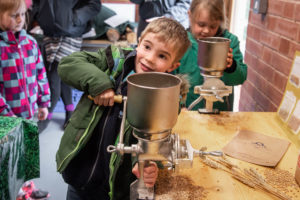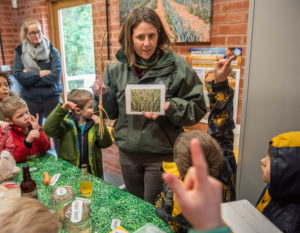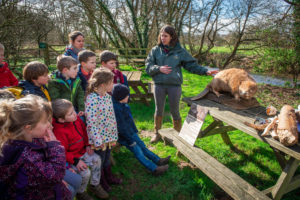Primary school pupils from North Devon travelled to the east of the county for a lesson in how grain was milled 1,000 years ago.
As a part of their ‘Farm to Fork’ topic, pupils aged between four to six years old, from Umberleigh Primary Academy and Brayford Academy, visited the East Devon village of Otterton where the ancient water-powered mill produces stoneground wholemeal flour in the same way as it did in Norman times.
Kate Ponting, Countryside Learning Officer for Clinton Devon Estates, has been leading workshops for schools at Otterton Mill; helping children understand where bread comes from and which everyday foods contain ingredients from crops and other produce grown within the Otter Valley.
Kate said: “The children were fascinated to discover the ‘treasure’ hidden inside each grain of wheat and to have some hands-on experience of grinding their own flour. They enjoyed the chance to taste some fresh wholemeal bread made from flour milled and then baked here at Otterton Mill.”
Umberleigh teacher, Laura Short, said: “Many children don’t know where their food comes from and, although they live in the countryside, they are really excited to learn that the flour comes from the wheat that grows in the fields around them.”
Chris Wright, who leases Otterton Mill from Clinton Devon Estates and runs the visitor centre, restaurant, gallery and shops with his wife Carol, gave the pupils a tour of the mill and explained how it is powered by the River Otter. Chris said: “The mill brings to life food production and history in a fascinating hands-on experience for the children.”
Otterton Mill was first recorded in the Domesday Book in 1068 and restored in 1977 to become fully operational once again. Today it mills flour which is used by the onsite artisan bakery to produce bread, cakes and scones.
The children’s visit to Otterton Mill also provided an opportunity for them to find out more about the beavers who are living on the River Otter and how to spot evidence of their work.
Sophie Beattie, a teacher from Brayford Academy, said: “Kate is enhancing the children’s knowledge and bringing to life our lessons about farming, food and wildlife. The students are full of awe and wonder at everything they’ve learnt.”


